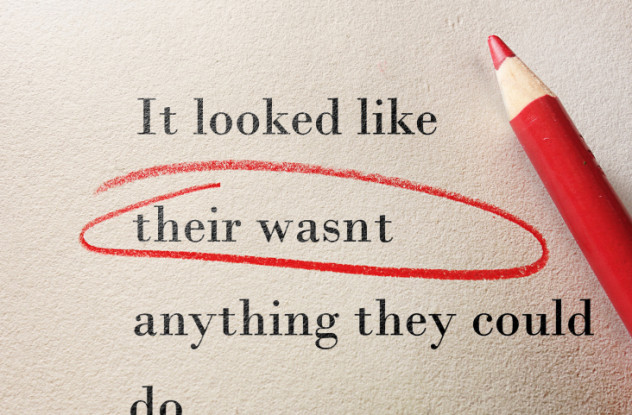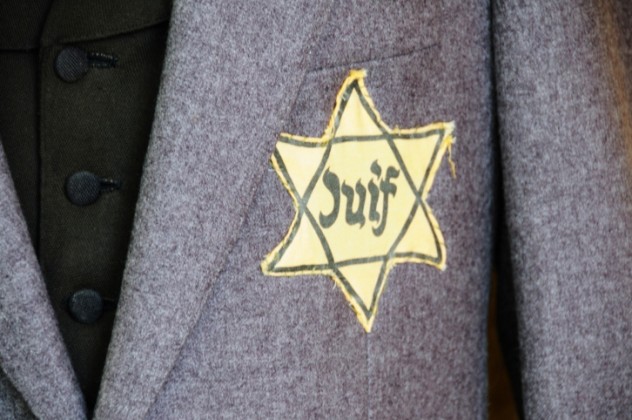 Weird Stuff
Weird Stuff  Weird Stuff
Weird Stuff  Animals
Animals 10 Inspiring Tales of Horses Being Human
 Mysteries
Mysteries Top 10 Haunting Facts About the Ghost Ship MV Alta
 History
History 10 Surprising Stories About the Texas Rangers
 Humans
Humans 10 Philosophers Who Were Driven Mad by Their Own Theories
 Miscellaneous
Miscellaneous 10 Video-Game-Worthy Weapons and Armors from History
 Weird Stuff
Weird Stuff 10 Psychics Who Accurately Predicted Wartime Events
 The Arts
The Arts 10 Pieces of Art Inspired by a Broken Heart
 Health
Health 10 Science Fiction-Sounding New Medical Treatments
 History
History 10 Surprising Facts About the Father of Submarine Warfare
 Weird Stuff
Weird Stuff 10 Times Real Laws Were Based on Bizarre Hypotheticals
 Animals
Animals 10 Inspiring Tales of Horses Being Human
 Mysteries
Mysteries Top 10 Haunting Facts About the Ghost Ship MV Alta
Who's Behind Listverse?

Jamie Frater
Head Editor
Jamie founded Listverse due to an insatiable desire to share fascinating, obscure, and bizarre facts. He has been a guest speaker on numerous national radio and television stations and is a five time published author.
More About Us History
History 10 Surprising Stories About the Texas Rangers
 Humans
Humans 10 Philosophers Who Were Driven Mad by Their Own Theories
 Miscellaneous
Miscellaneous 10 Video-Game-Worthy Weapons and Armors from History
 Weird Stuff
Weird Stuff 10 Psychics Who Accurately Predicted Wartime Events
 The Arts
The Arts 10 Pieces of Art Inspired by a Broken Heart
 Health
Health 10 Science Fiction-Sounding New Medical Treatments
 History
History 10 Surprising Facts About the Father of Submarine Warfare
10 Most Absurd Things Banned On Politically Correct College Campuses
College campuses across the country used to be arenas for debauchery and loose inhibitions, but many these days function as micromanaged zones of political correctness where students and faculty alike walk on eggshells for fear of offending someone. Political correctness on college campuses has gotten so extreme in some cases that comedians like Jerry Seinfeld have stopped performing there altogether. Seinfeld claims the rampant political correctness will “destroy comedy.” The outrageously autocratic zeal for political correctness sometimes bans downright commonplace activities and censors everyday sayings, and that’s just no fun at all.
10 Clapping
Colleges In The United Kingdom

The National Union of Students Women’s Campaign, a feminist college student group in Britain, announced in March 2015 that they would ban clapping at their future conferences held at UK colleges.
The feminist group claimed that the act of clapping could “trigger some people’s anxiety,” and therefore should be banned from all of their conferences. Instead, the feminist students instructed those who attend conferences to use jazz hands—to wave their hands silently in the air—when they wished to display approval. A delegate of the group said that replacing clapping with silent jazz hands was a way to create “a more inclusive atmosphere.” You never know what sounds might trigger anxiety.
9 Spelling And Grammar Corrections
University Of California, Los Angeles

While some crusaders of political correctness may seek to ban offensive words from our vernacular, others have begun to attack correct grammar as offensive. UCLA professor Val Rust thought he was just doing his job by correcting the spelling and grammatical errors he found in his students’ papers in a graduate-level class, but when students got their papers back, some of them alleged that the spelling and grammar corrections were a form of microaggression against the students, some of whom were minorities.
The offended students claimed that the spelling and grammar corrections were a part of a “hostile campus climate” for students of color. They argued that the professor’s corrections of their incorrect spelling and grammar were themselves incorrect because they were “perceived grammatical choices that in actuality reflect ideologies.”
Some students were so offended by having their grammar and spelling corrected that they staged a sit-in protest of the class. Twenty-five students sat in a graduate class and disrupted Professor Rust’s planned lecture by reading a group letter aloud. The letter claimed that the grammar and spelling corrections were creating an unsafe climate for students of color. While reading the anti-grammar letter, one student protester began to cry. “I’m tired, and it hurts me so much,” she said.
After the anti-grammar protest, Professor Rust sent a letter to faculty explaining his spelling corrections, saying, “I have attempted to be rather thorough on the papers and am particularly concerned that they do a good job with their bibliographies and citations, and these students apparently don’t feel that is appropriate.”
8 A Statue Of A Man In Tighty-Whities
Wellesley College
Do you ever look at Michelangelo’s sculpture David and just get . . . offended? Well, if have the urge to censor the Renaissance masterpiece or sculptures like it, then you may feel right at home with the student body of Wellesley College.
In winter 2014, a sculptor named Tony Matelli held an exhibition of his work at the Davis Museum of Wellesley College. Trouble unexpectedly began for Matelli when he took his artwork outside of the museum on public display for the college’s student body, which once included Hillary Clinton. Matelli installed a sculpture on the campus called Sleepwalker, a realistic sculpture of a pudgy, balding man in his tighty-whities.
Much to Matelli’s surprise, students at the all-female college claimed that the comical statue of a man in his underwear offended and even frightened them. The students demanded that the sculpture be removed because it invoked sexual assault.
One angry feminist student wrote to the the university’s museum director, “What does this statue do if not remind us of the fact of male privilege every single time we pass it, every single time we think about it, every single time we are forced to acknowledge its presence. As if we need any more reminders.”
A junior at the college created an online petition to demand the sculpture be removed, writing that the art “has become a source of apprehension, fear, and triggering thoughts regarding sexual assault for some members of the campus community.” The petition eventually gained 1,000 signatures endorsing the statue’s removal.
At first, the sculpture remained unmoved when the university did not cave to the complaints from sensitive students at the college. However, it was soon vandalized. One of the sculpture’s bitter detractors defaced the sculpture by sloppily spraying yellow spray paint over it.
In doing so, the feminist vandals joined a long history of protesting by defacing artwork, like the Catholic Extremists who put fig leaves over genitals in paintings and broke them off sculptures during the Protestant Reformation, or the members of the Taliban who destroyed 1,700-year-old statues of the Buddha in 2001.
7 The Word ‘Crazy’
Smith College

In a 1972 monologue, comedian George Carlin listed the infamous Seven Words You Can Never Say on Television. A radio broadcast of the monologue about curse words actually led to a Supreme Court decision that determined that the US government has the right to censor indecent words from television and radio airwaves, testing the limits of the First Amendment in the process. While that original list of seven dirty words includes the swears we’re all familiar with, college students at Smith College would like to add at least one more word to that list of taboos.
After a panel on free speech was held at Smith College, the student newspaper (cleverly called the Smith Sophian) covered the event and posted a transcript of what was said. But when speakers at the event said that they were getting “wild and crazy,” the student newspaper’s PC police put an end to such shenanigans and refused to print the offensive language.
Unsurprisingly, the newspaper censors instances of established racial and gender slurs. Oddly enough, the student paper decided to censor another “c-word” they thought would be too offensive to print: the word “crazy.” According to the student newspaper, the word “crazy” is ableist, offensive to mentally disabled individuals. The paper’s student editors replaced the word with “ableist slur” in brackets.
One instance in the transcript where the censorship occurs makes the practice look even more absurd. The censorship was prompted when a speaker at the even said, “We’re just wild and crazy, aren’t we?” The word “crazy” was used five times at the event and censored in all five occurrences in the transcript. The Smith Sophian thought this censored transcript would be so offensive and anxiety-inducing to its readers that they even prefaced it with a trigger warning.
6 Burritos
Stevenson College

The next time you chow down on a burrito, think twice. It might offend someone if you do it in the wrong context. That’s how students at Stevenson College found themselves in an unexpected controversy.
Students at Stevenson College in Santa Cruz, California, held a science fiction event that featured pictures of spaceships and aliens. The sci-fi enthusiasts quickly found themselves in trouble with the school’s administrators because of their choice of food at the event. The students who organized the event purportedly chose to serve Mexican food at the party because “they hadn’t yet had Mexican food for one of these events” and couldn’t find any food that was “space-related.”
One student didn’t see it that way and wrote a complaint to a school administrator alleging that the choice of burritos at the alien-themed event was offensive because it made “a connection between individuals of Latino heritage or undocumented students and ‘aliens.’ ”
UC Santa Cruz administrator Dr. Carolyn Golz swiftly issued a public apology for allowing the students to serve burritos in the presence of spaceship drawings: “This incident demonstrated a cultural insensitivity on the part of the program planners and, though it was an unintentional mistake, I recognize that this incident caused harm within our community and negatively impacted students.”
After the burrito brouhaha, the college now requires any students who wish to organize an event on campus to undergo cultural competence training. College administrators claim they have put into place “mechanisms for future program planning that will ensure college programs are culturally sensitive and inclusive.”
5 Biased Language
University Of New Hampshire
Students at the University of New Hampshire had their vocabulary drastically shortened for the sake of political correctness. The university gave its students a series of resources on its website so they could tackle their college life, including a “bias-free language guide” that instructs students to stop using a long list of seemingly inoffensive and common words.
The university offered alternative phrases to replace the offensive word. The guide claimed the word “homosexual” was not politically correct enough and should be replaced with the term “same gender loving.” “American” is offensive because using the term implies that the US is the only country in the continents of North and South America. (It’s certainly imprecise, even if finding it offensive is a bit of a stretch.)
Similarly, the guide instructed its students to stop using the word “Caucasian” and instead use the more politically correct “European-American individuals.” “Elderly” was replaced by “people of an advanced age,” and “healthy” with “non-disabled individual.” The guide would also complicate parental visits; students were told the words “mothering” or “fathering” should no longer be used. According to the guide, students should “avoid gendering a non-gendered activity.”
After the language guide was exposed to the public at large, University of New Hampshire’s president distanced himself and his administration from the bias-free guide two years after it was developed by university students. President Huddleston said that he was “troubled by many things” in the guide and clarified that it was not official policy of the University of New Hampshire. The language guide was then removed from the university’s website.
4 The Vagina Monologues
Mount Holyoke College
 The Vagina Monologues is a play written by feminist Eve Ensler that has been described as the “Holy Grail of Feminism.” The play was written by Ensler to empower women and address the issue of violence against women. The Vagina Monologues has inspired V-Day, an event that takes place each year that seeks to end violence against women.
The Vagina Monologues is a play written by feminist Eve Ensler that has been described as the “Holy Grail of Feminism.” The play was written by Ensler to empower women and address the issue of violence against women. The Vagina Monologues has inspired V-Day, an event that takes place each year that seeks to end violence against women.
An all-women’s college in Massachusetts, Mount Holyoke College was set to exhibit a production of the play as part of its own V-Day. At least, they were going to until the play wasn’t deemed politically correct enough.
Mount Holyoke College had put on an annual production of The Vagina Monologues as part of its V-Day event each year. The production was supposed to raise awareness about violence against women and raise money for organizations that seek to curb it.
But the play wasn’t allowed to be exhibited at Mount Holyoke College’s 2015 V-Day event. Students in the theater board felt the play shouldn’t be produced because it isn’t inclusive of transgender students and would be offensive to students who identify as women but don’t have a vagina. (Never mind that one of the monologues, They Beat The Girl Out Of My Boy . . . Or So They Tried, is about the experience of a transgender woman and had been included in Mount Holyoke’s 2010 performance of The Vagina Monologues.)
A representative from the college chastised the feminist play. “At its core, the show offers an extremely narrow perspective on what it means to be a woman.” The student further defended the decision to cancel the play, stating that “Gender is a wide and varied experience, one that cannot simply be reduced to biological or anatomical distinctions, and many of us who have participated in the show have grown increasingly uncomfortable presenting material that is inherently reductionist and exclusive.”
The college decided to write its own politically correct version in order to avoid the perception that the play is not inclusive enough.
3 Shokazoba
Hampshire College
Trouble began for a band called Shokazoba when they were scheduled to play a Halloween concert at Hampshire College in Massachusetts. Shokazoba plays a genre of music called Afrobeat, which is a fusion of funk and jazz music with African rhythms. However, this style proved to be the band’s undoing because of one problem. The band’s members are mostly white.
Once Shokazoba had been booked to play Hampshire College on Halloween, some of the college’s students began to protest the concert. The PC college students called for it to be canceled because they felt the band had too many white players.
According to Hampshire College, the students “questioned the selection of one band, asking whether it was a predominantly white Afrobeat band, and expressing their concerns about cultural appropriation and the need to respect marginalized cultures.”
It wasn’t long until enough students complained about being offended by the ethnicity of the Afrobeat band that the college decided to cancel the concert altogether. The student committee in charge of the event justified the decision by claiming it was canceled because of the “discomfort expressed by members of the community.”
The racially motivated decision soon prompted a response from the American Civil Liberties Union (ACLU). They sent a letter to Hampshire College’s president, saying the organization was “deeply disturbed” by the college’s decision to cancel the concert.
The ACLU lawyer told Hampshire College, “Invocation of ‘I am fearful’ or ‘I am uncomfortable’ or ‘cultural appropriation’ as shibboleths that warrant censorship results improperly and dangerously in the prohibition of artistic (and other) expression.”
In its official statement on the cancellation, Hampshire College denied that the Afrobeat concert was canceled solely because of racially motivated reasons, which is illegal under anti-discrimination laws.
2 Small Talk
University Of California

If you thought making awkward small talk was hard enough already, then you’re really going to hate the University of California president, who recently declared some small talk staples to be inherently racist or sexist.
Current University of California President Janet Napolitano recently issued a list of microaggressions that all faculty should avoid using if they want to keep their jobs. Napolitano believed the listed phrases and questions may harbor covert racism or sexism and should therefore be banned from the universities.
Surprisingly enough, this list of taboo microaggressions included many common questions and phrases seemingly devoid of any ill intent. One of the banned, supposedly offensive phrases is “America is a land of opportunity.” According to Napolitano and her politically correct cohorts, such a phrase is a form of coded, covert racism that creates a toxic campus culture.
Other phrases university faculty were banned from saying include “America is a melting pot,” “I believe the most qualified person should get the job,” and “There is only one race, the human race.” Another banned phrase was “When I look at you, I don’t see color.” Colorblind professors everywhere began quivering in fear.
Faculty were also banned from asking students basic small talk questions, such as “Where are you from?” and “Where were you born?” These questions can be construed as racist. According to Napolitano, banning these microaggressions from California’s universities was part of an initiative to “improve campus climate.”
1 Holocaust Commemoration
Goldsmiths, University Of London

In October 2014, a seemingly innocuous proposal came before the Goldsmiths student union to commemorate the Holocaust. However, the students voted against commemorating the Holocaust, voting it down almost unanimously—60 to 1.
After the proposal was rejected, the union’s officer of education took to Twitter to explain to the confused public why they had voted down such a motion. Sarah El-alfy claimed the student union voted against the proposal commemorating the Holocaust because it was too Eurocentric.
Another Goldsmiths student criticized the motion by calling it “colonialist” and claiming that “white people should not be proposing motions condemning genocides.”
The rejection came the day after the same student union rejected another motion to condemn terrorist group ISIS, claiming that condemning such terrorists is a form of Islamophobia.
In response to the international head scratching the student union received, its education officer claimed she would rewrite the proposal to make it fit the students’ politically correct sensibilities.
Months later, another Goldsmiths student union officer, Bahar Mustafa, organized an event at the university to protest inequality. However, on advertisement for the event, Mustafa wrote, “If you’ve been invited and you’re a man and/or white PLEASE DON’T COME.”
Spurred by the criticism she received for discriminating against white people and men, Mustafa soon took to Twitter to express her reaction: “kill all white men.”
Predictably, Mustafa’s tweet roused a reaction with the general public in addition to the police. British police investigated the student and her genocidal ambitions, but no charges were filed. An online petition quickly garnered the signatures of 165 students asking for her to be removed from her position over the murderous statement. But the student union’s leadership remained unmoved by both the reaction and Mustafa’s genocidal remark. With the unflinching support of the student union, Mustafa was able to keep her position as officer of welfare and diversity in addition to her paycheck funded by British taxpayers.








